In the exciting yet unpredictable world of feline pregnancy, numerous potential pregnancy risks can threaten both the life of the mother cat and her unborn kittens.
While witnessing the "miracle of life" or being present for the birth of kittens may seem appealing, the reality is often far more complex.
Pregnancy and childbirth can be fraught with complications, and even with the best veterinary care and supervision, there are no guarantees of a successful outcome.
If you're contemplating allowing your cat to become pregnant and have kittens, it's crucial to consider the potential dangers that could arise.
In this article, we'll explore 17 life-threatening risks associated with feline pregnancy and recommendations for preventing or mitigating these risks.
As you read through this article, please remember that there is a straightforward way to protect your cat from these potentially deadly complications: prevent her from becoming pregnant by having her spayed.
This single act could very well save her life.
Warning: The following contains graphic descriptions. It may disturb some people, so you may want to stop here if you're squeamish.
1. Your Cat Could Get Sick
Your cat's immune system partially suppresses during pregnancy, making her more vulnerable to infections.
Bacteria, viruses, and fungi constantly lurk in the environment, and with her weakened defenses, your cat faces higher pregnancy risks, including increased susceptibility to infections.
What you can do: Ensure your cat is current on her vaccinations before she becomes pregnant. Maintain a clean, stress-free environment for your cat.
Stay alert for signs of health issues, keep in close contact with your veterinarian, and be ready to invest in veterinary care.
2. The Kittens Could Get Sick While Still In The Womb
Once the mother cat becomes infected with a pathogen - sometimes without showing any symptoms - she may pass it on to her unborn kittens.
Not all infections are contagious in utero, but many are.
The fetuses could become sick with feline leukemia virus, panleukopenia (parvo), toxoplasmosis, coronavirus, or FIV.
Some of these infections may kill them, while others could cause birth defects.
What you can do: To mitigate these pregnancy risks, do your best to keep the mother cat healthy, as mentioned earlier, and be ready to address any subsequent complications.
3. The Kittens Could Die And Become Stuck In The Womb
Kittens sometimes die before being born. They can die from infection or due to a congenital defect. Usually, the pregnancy will be spontaneously aborted at this point.
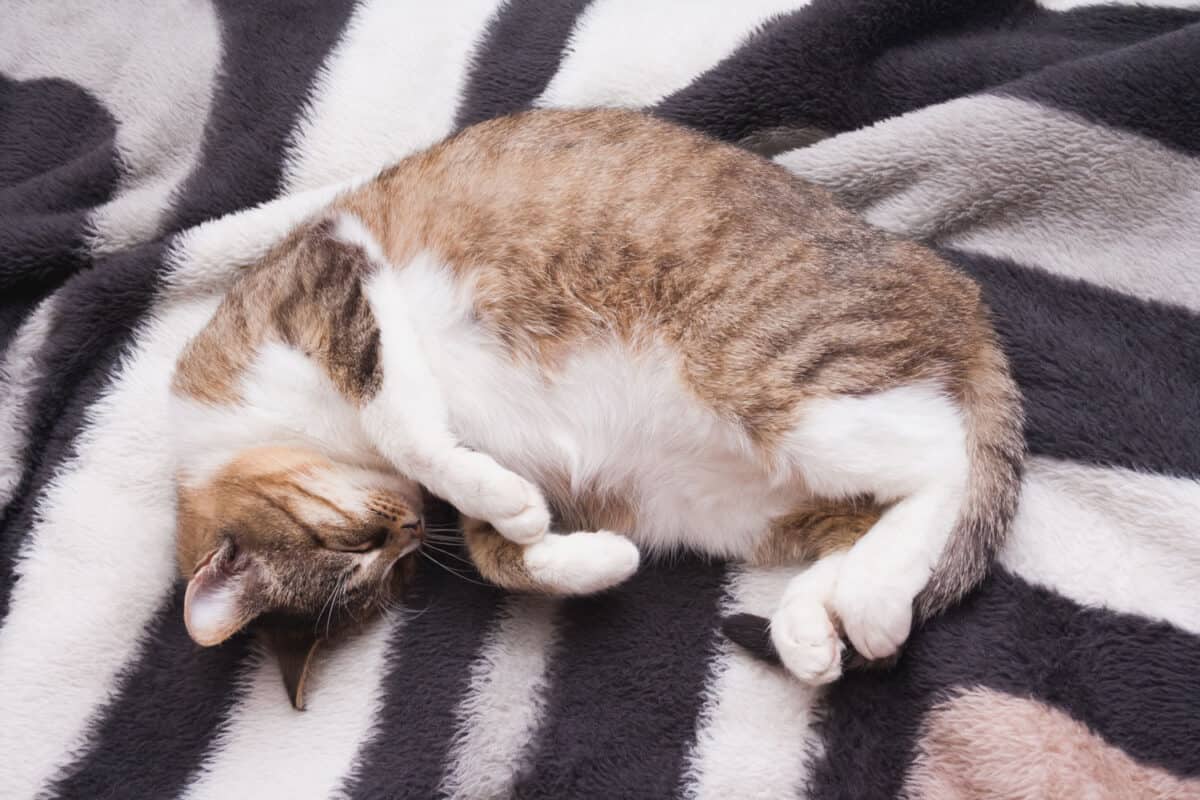
However, sometimes a kitten dies inside the womb without triggering a miscarriage.
It could literally rot away inside the mother, requiring immediate veterinary intervention and a c-section to remove the putrefied body.
Other times, that tiny dead kitten can remain stuck in the womb without decomposing. Such a body may become calcified only to be discovered during a future spay surgery.
What you can do: Monitor your cat's pregnancy, and if you suspect something has gone wrong, get her to a veterinarian.
Pay special attention to smelly secretions, as these could be an indication of a dead kitten inside the uterus. Have the funds ready for an emergency c-section to save your cat's life.
4. Your Cat Could Get Eclampsia
Eclampsia is a dangerous medical condition caused by severe loss of calcium and hypertension.
Symptoms include trembling of the muscles, high fever, loss of appetite, agitated behavior, excessive panting, and difficulty walking. Left untreated, it could be fatal.
What you can do: Monitor your cat's pregnancy, and if you suspect something is going wrong, get her to a veterinarian sooner rather than later.
Make sure you have the funds for proper medical care in advance.
5. Your Cat Could Have A Miscarriage
Cats may experience miscarriages due to various pregnancy risks.
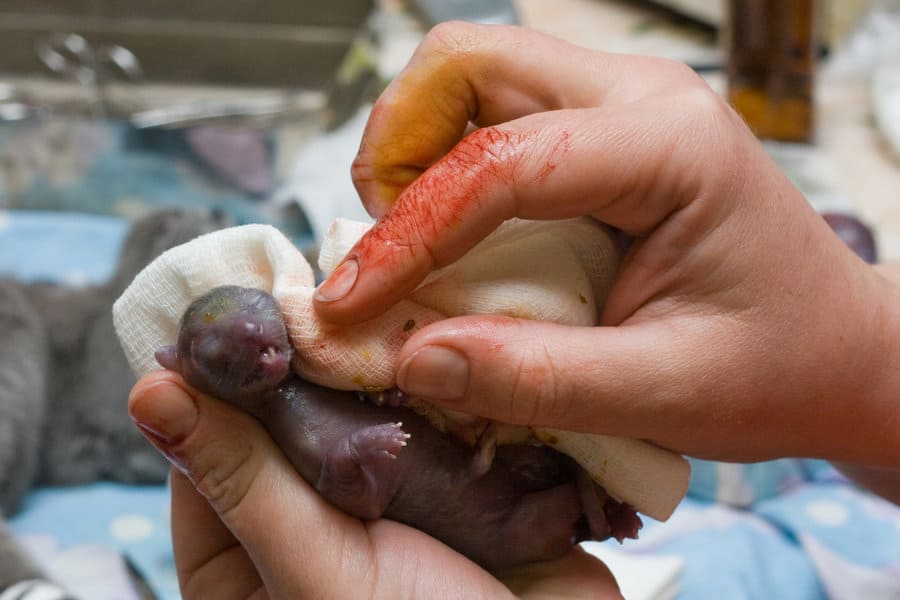
As an owner, you might not receive any warning and could wake up one morning to the distressing sight of dead cat fetuses on the floor.
These fetuses might appear deformed or too young even to resemble kittens. This is not a sight for the faint of heart, whether for children or adults.
What you can do: Provide quality nutrition and medical care to your pregnant queen and prepare yourself for the possibility of losing the litter, even with the best care.
6. Your Cat May Need To Have A C-Section
Sometimes, a cat goes into labor, but no kittens come out.
The only way to deliver the kittens is through a c-section, in which a veterinarian cuts through the mother's abdomen into the uterus to deliver the babies.
If the veterinarian doesn't perform a c-section in time, both the cat and kittens could die.
What you can do: Be prepared for emergencies. Have your veterinarian's contact details, including the phone number for the emergency clinic in your area.
Have the funds for paying for a c-section ready (it can cost between $500 and $1000).
7. Your Cat Can Bleed To Death During Or Right After Birth
During the birth process, the cat's uterus expels the kittens along with their placentas and a certain amount of blood.
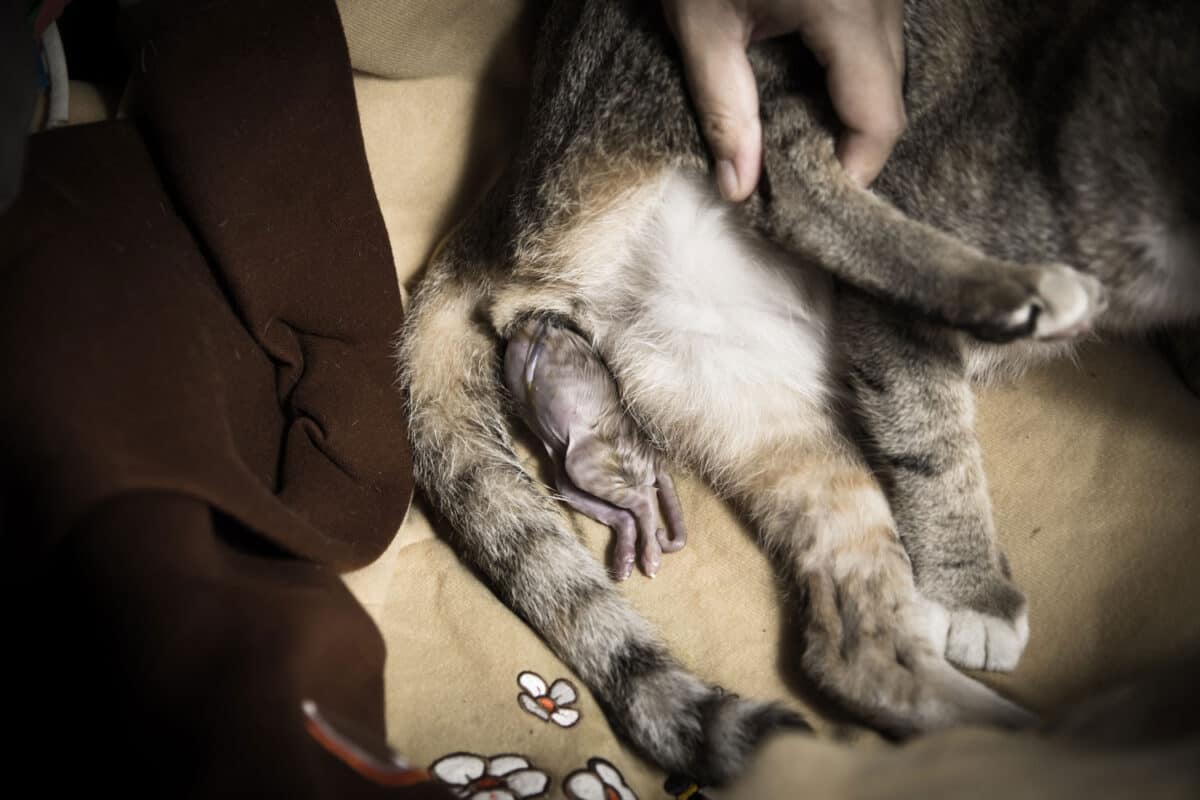
Sometimes, something goes wrong, and the bleeding continues. If a placenta roots too deeply in the uterine wall, your cat could bleed to death without immediate veterinary assistance.
What you can do: Carefully follow the birth process and prepare for emergencies. Count the kittens and placentas as they deliver, and ensure that all placentas come out.
Have your veterinarian's contact details, including the phone number for the emergency clinic in your area. Have the funds for paying for emergency vet care.
8. Your Cat Can Get An Infection Called Pyometra
Pyometra is an infection of the uterus. It can happen to unspayed female cats at any point in their lives and isn't necessarily a pregnancy complication.
However, uterine infection can happen during pregnancy as well as following birth.
Symptoms may include a vaginal discharge (in the case of open pyometra), loss of appetite, lethargy, and fever.
Pyometra requires an emergency spay procedure or an intensive medical care regime involving hospitalization for administering strong antibiotics.
Left untreated, this condition could kill your cat.
What you can do: Monitor your cat's health closely.
If your female cat is not spayed, be aware of the risk of pyometra and consider spaying her to prevent this potentially deadly disease, which is one of the serious pregnancy risks.
9. Your Cat Could Have Problems With Milk Production
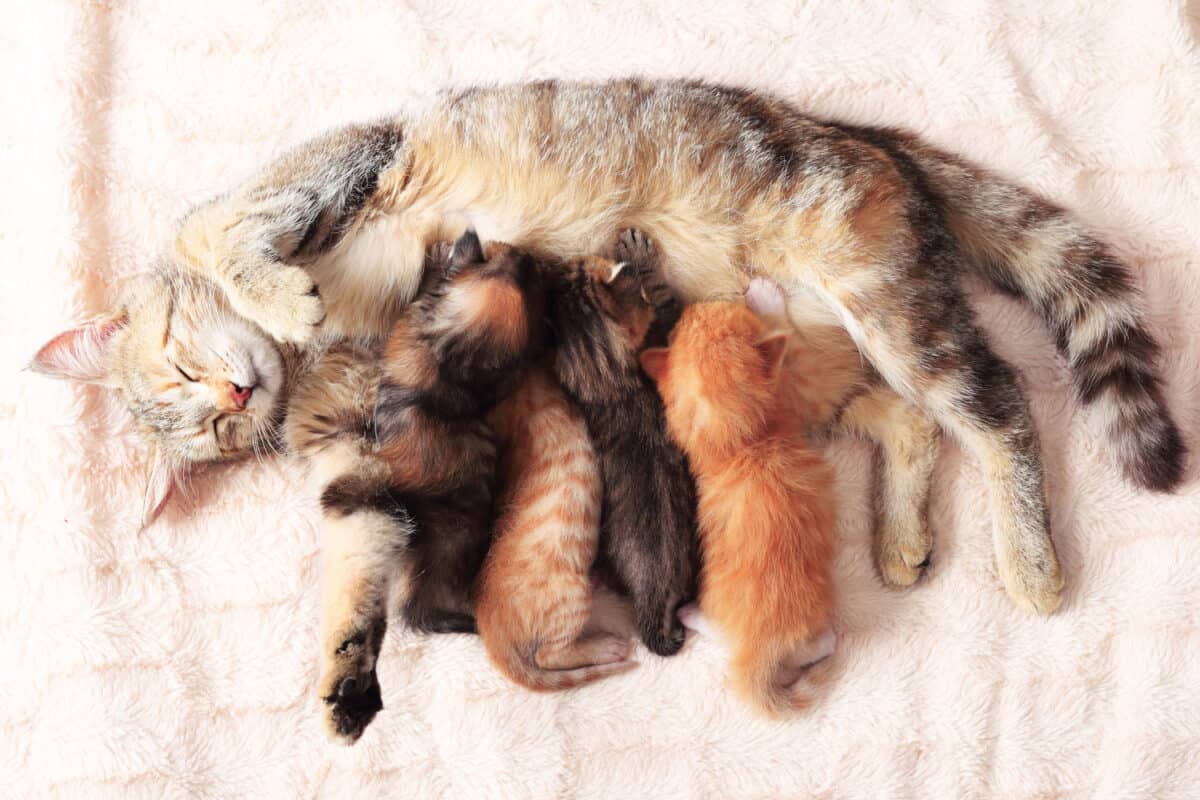
Your cat may be unable to produce enough milk to feed the kittens or even any milk.
The medical term for lack of milk is agalactia, and it can happen when the kittens are born prematurely or if the mother is malnourished and under stress.
Dysgalactia is the condition that occurs when there is not enough milk, and it can happen when the cat has too many kittens to care for (usually more than four).
What you can do: Prepare to feed the newborn kittens. Educate yourself about newborn kitten care, and understand that you may need to step in at any point, including feeding the newborns every two hours.
Have the right equipment on hand before your cat goes into labor.
10. Your Cat Could Suffer From "Baked Breasts"
Your cat can temporarily accumulate milk in the breast tissue, also known as "baked breasts." This painful condition is medically known as galactostasis.
What you can do: You’ll need to apply warm compresses to ease Kitty’s pain. Besides the visual, symptoms are general discomfort and tenderness to the touch.
If your cat experiences visible discomfort when nursing and the warm compresses don't help, seek veterinary advice immediately, as your cat could be developing mastitis (mammary infection).
SIGN UP FOR THECATSITE'S EMAIL UPDATES >
11. Your Cat Could Have A Mammary Infection
If bacteria make their way through the nipples into the breast, your cat can develop an infection of the mammary glands, medically known as mastitis.
This puts the mother cat and the kittens at immediate risk and calls for emergency veterinary intervention.
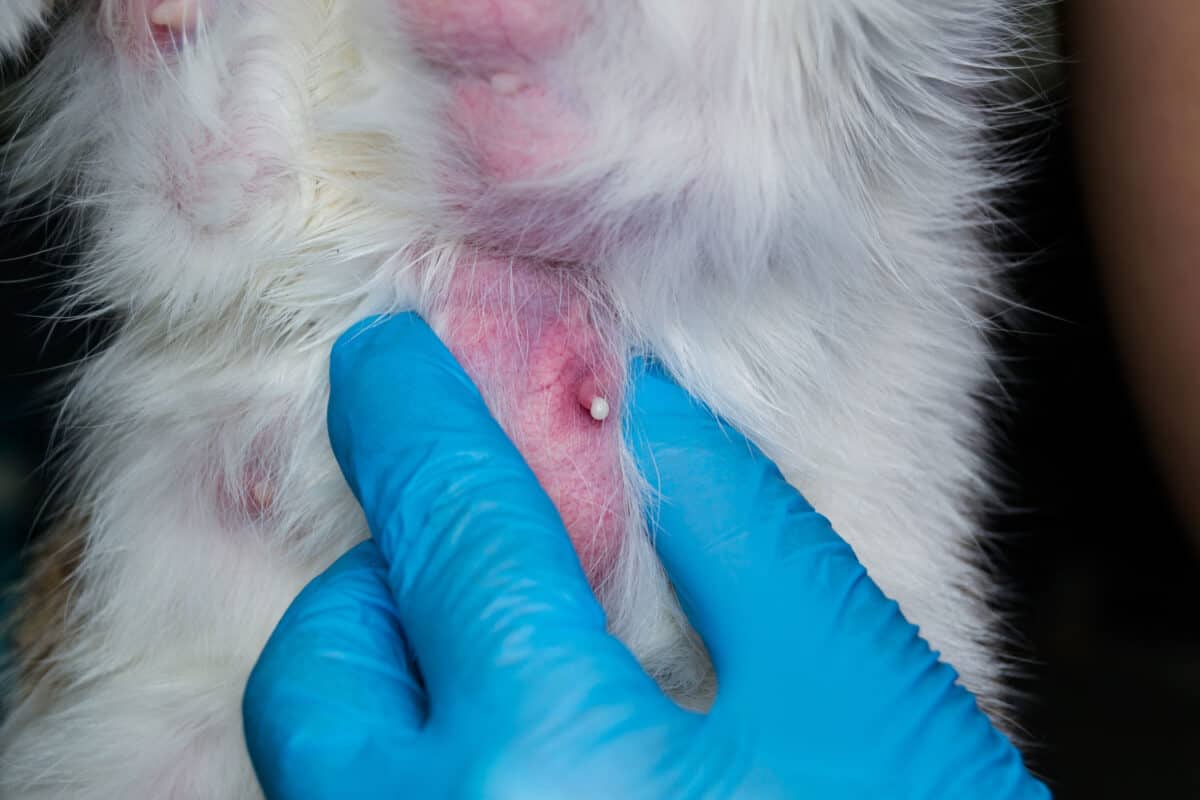
What you can do: Monitor the mother cat's medical condition, including her nipples and breasts.
If they seem red, swollen or if there's a discoloration of the milk, consult with your veterinarian immediately.
Your cat may require antibiotics, and you may need to switch the kittens to hand feeding.
12. Your Cat Might Eat Her Newborn Young Kittens
Nobody knows why this happens, but some cats, especially inexperienced mothers having their first litter, may kill and even eat one or more of the kittens.
Sometimes, the mother cat fully ingests the kittens, causing them to "disappear." Other times, shocked owners find tiny body parts left behind.
What you can do: Provide your cat with the best possible conditions. Make sure she can raise her kittens in a quiet environment, free of stressful disturbances.
If you notice rising stress levels, keep guests (especially children and other pets) away. Read more about stress here: Is Your Cat Stressed Out?
13. Your Cat Might Give Birth To Deformed Kittens
There are many kinds of possible birth defects in kittens. Some are visually horrific such as an incomplete skull, a head full of fluids, or absent eyes.
Others are invisible at first but prevent the kitten from digesting food or developing properly. Such kittens may be born dead or die after birth, some sooner rather than later.
What you can do: There isn't much you can do. If your cat gives birth to a visibly deformed kitten, please take it to a vet for assessment and, if necessary, euthanization.
Be aware that some birth defects may require surgery to correct, so prepare yourself for the possibility of an expensive procedure.
14. Your Cat Could Give Birth To Premature Kittens
If your cat doesn't carry her pregnancy to the full term of at least 64 days, she could give birth prematurely.
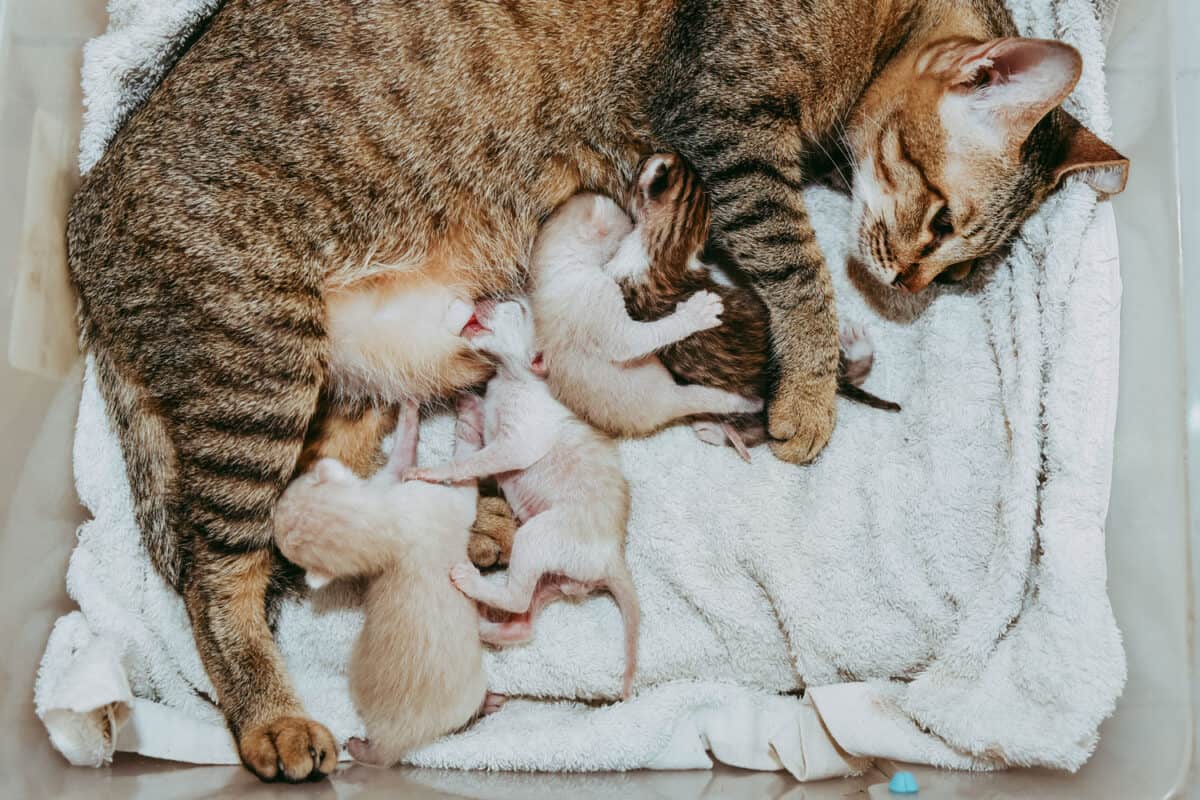
Preemie kittens are extremely fragile and may not survive, depending on how far along in their development they are. They could die within hours or days of birth.
What you can do: Experienced rescuers may be able to help you care for premature kittens, so it's best to contact a local rescue organization and ask if they can put you in touch with such a person.
15. Your Cat Could Reject One Or More Of The Kittens
Rejection of a kitten (one or more) can happen if the mother is inexperienced, stressed, malnourished, or sick.
The mother cat can also sense if a kitten is sick or deformed and push that kitten out of the nest. Sometimes there is no known reason for the rejection.
A rejected kitten could soon die without nursing. If left away from the mother cat for too long, a newborn kitten could die from hypothermia too.
What you can do: Monitor the kittens and their interaction with the mother.
If you see any of the newborn kittens away from the mother cat, be prepared to step in and take over as you may need to hand rear that kitten in order to save its life.
16. The Kittens Could Become Very Sick
Even when a cat gives birth to healthy kittens, they may still become sick. It could happen during the first week or two, or later on when they are a couple of months old.
Just like babies, kittens are far more susceptible to disease and require intensive veterinary care in case of infection.
What you can do: Keep the area around the litter clean. Wash your hands before and after handling the kittens, especially if there are other cats in your household.
Carefully monitor the kittens' development and have a weight chart drawn for each one. If you notice anything wrong or a kitten fails to gain weight, consult your veterinarian immediately.
Still Want Your Cats To Have Kittens?
If you're still contemplating allowing your cat to give birth, it's crucial to be fully prepared for the associated pregnancy risks.
Ensure you have enough funds set aside for both routine checkups and emergency care.
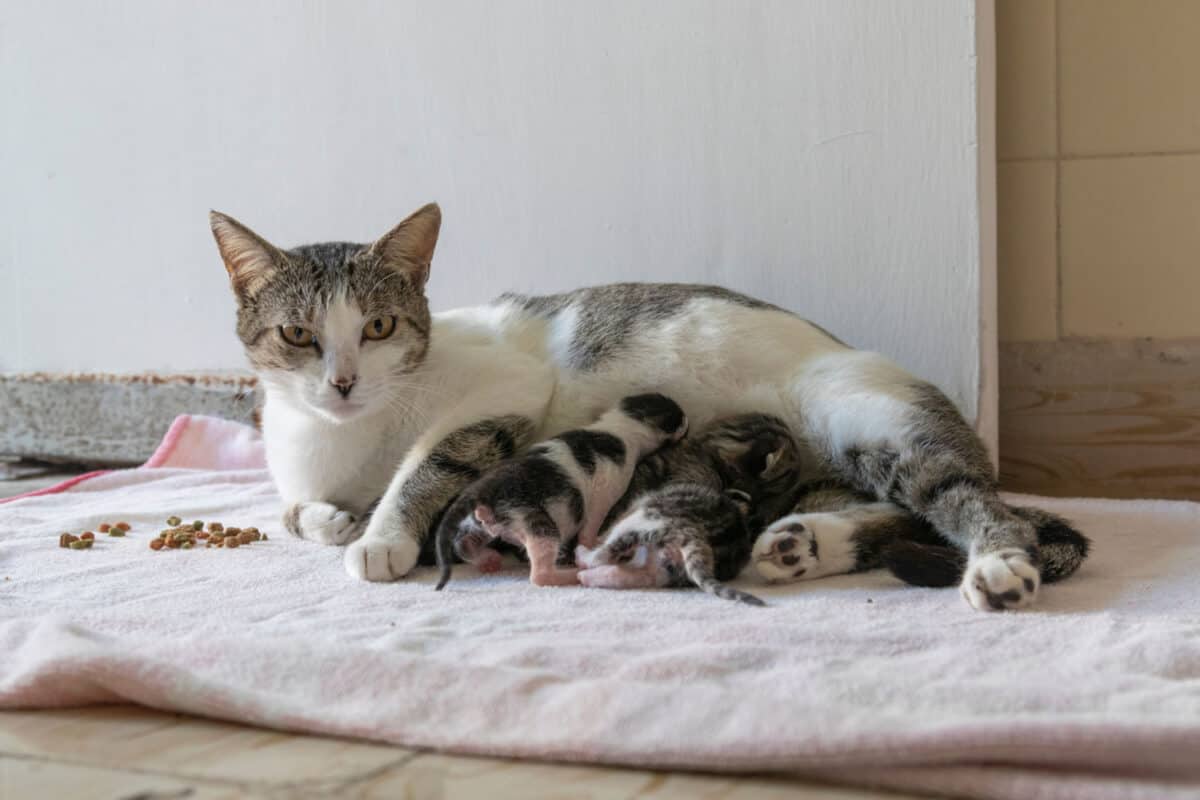
Consult your vet in advance about potential costs for pre-mating checkups, ultrasounds or x-rays during pregnancy, c-sections, and post-birth veterinary care for the kittens.
Discuss how to arrange for emergency visits and payment options.
Offer your pregnant cat high-quality food, preferably formulated for pregnant and lactating queens, and provide a safe, quiet environment for her.
Allowing your cat to breed may seem tempting, but it's important to recognize the pregnancy risks involved.
Spaying your cat is the most effective way to prevent these life-threatening situations.
By doing so, you'll have a healthier, pampered cat to enjoy without facing the challenges of pregnancy and birth.
Moreover, by letting your cat have kittens, you contribute to cat overpopulation and take away potential homes from shelter kittens.
SIGN UP FOR THECATSITE'S EMAIL UPDATES >
Please share this article and help us spread the message that we should not take the decision to bring kittens into the world lightly, especially considering the significant pregnancy risks involved.
You may pin the image below for free on your social media accounts.
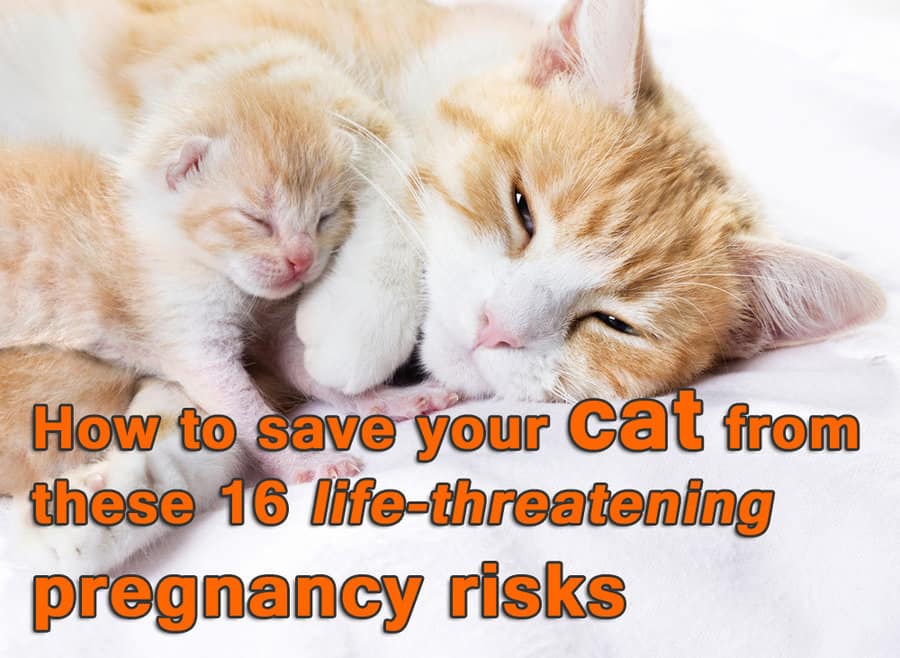
If your cat is pregnant and you need advice about dealing with one of the situations described above please post about it in the Pregnant Cat & Kitten Care forum.
Note: We may get commissions for purchases made through links on this page.

![Ringworm in a cat, How to deal with ringworm in cats [Inc. The Housecleaning Regime]](https://thecatsite.com/c/wp-content/uploads/2014/09/ringworm-260x170.jpeg)
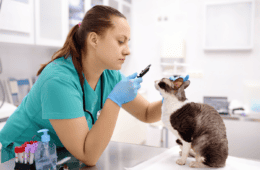
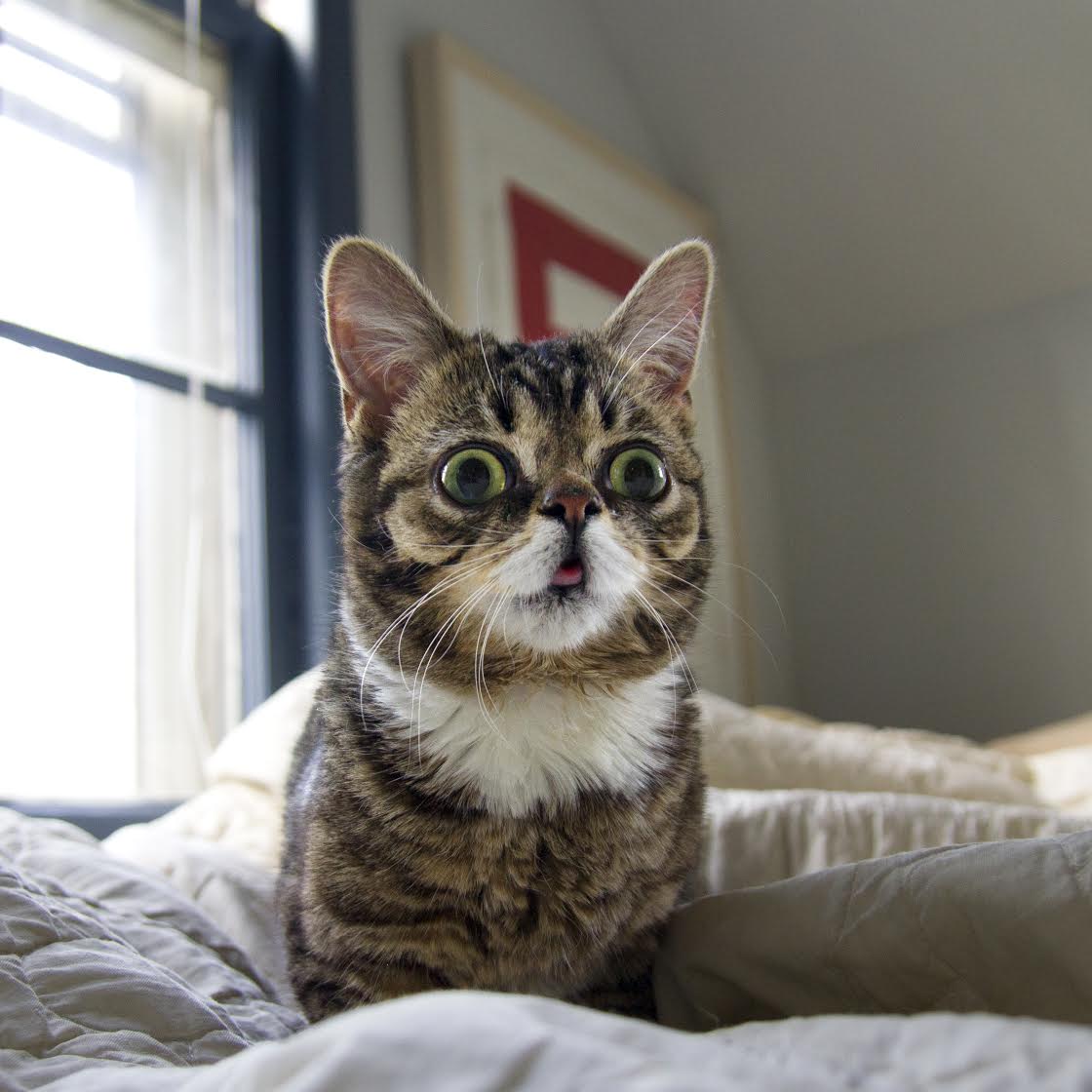
21 comments on “How To Save Your Cat From These 16 Life-Threatening Pregnancy Risks”